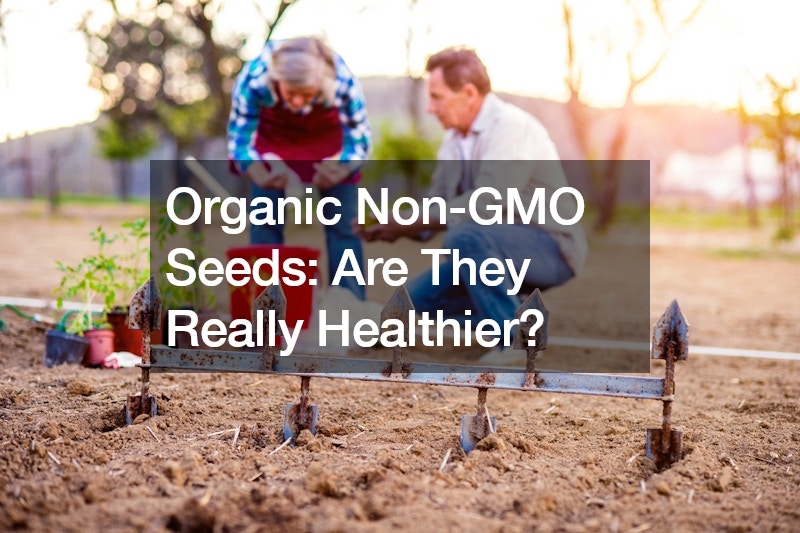
Disclaimer: This website provides health information for educational purposes only and is not a substitute for professional medical advice, diagnosis, or treatment. Always seek the guidance of a qualified healthcare provider with any questions you may have.
If you’ve ever strolled down the seed aisle at your local garden center or browsed online for seeds to start your garden, you’ve likely come across the terms “organic” and “non-GMO.” But what do these labels really mean, and are organic non-GMO seeds truly healthier for you and the environment? Let’s dig into the facts and myths surrounding these popular seed options.
Understanding Organic Seeds
Organic seeds are produced from plants that have been grown without the use of synthetic pesticides, herbicides, fertilizers, or genetically modified organisms (GMOs). Instead, organic farmers rely on natural methods, such as crop rotation, composting, and biological pest control, to maintain soil fertility and manage pests.
The goal of organic farming is to promote biodiversity, protect natural resources, and minimize the use of synthetic inputs that can harm human health and the environment.
The video linked in this article also has more information on understanding organic seeds. In it, the speaker chats about the misunderstandings regarding seed labels, especially honing in on organic and non-GMO seeds. They bust some myths, break down the tiny differences between labeled and non-labeled seeds, and stress the importance of making smart choices when buying seeds for your garden. Finally, they remind us that going organic can sometimes mean spending extra money without much benefit if you’re not buying from the right brand.
The Non-GMO Difference
Non-GMO seeds, on the other hand, are seeds that have not been genetically modified using biotechnology techniques. Genetic modification involves altering the DNA of a plant to introduce new traits such as resistance to pests or tolerance to herbicides. While GMO crops are widely used in conventional agriculture, non-GMO seeds are bred using traditional methods, such as selective breeding and hybridization, to achieve desired characteristics.
Health Benefits of Organic Non-GMO Seeds
So, are organic non-GMO seeds really healthier for you? While there is ongoing debate and research on this topic, there are several potential health benefits associated with choosing organic non-GMO seeds:
- Reduced Exposure to Harmful Chemicals: Organic farming practices minimize the use of synthetic pesticides and herbicides, reducing the risk of exposure to potentially harmful chemicals for both farmers and consumers.
- Nutrient Density: Some studies suggest that organic crops may have higher levels of certain nutrients, such as antioxidants and vitamins, compared to conventionally grown crops. These higher nutrient levels could potentially translate to healthier plants and produce.
- Environmental Benefits: Organic farming practices promote soil health, water conservation, and biodiversity, which can have positive impacts on the environment and ecosystem resilience. By choosing organic non-GMO seeds, you’re supporting sustainable agriculture practices that protect natural resources and reduce pollution.
Debunking Myths
Despite the potential benefits of organic non-GMO seeds, there are some common myths and misconceptions surrounding their use:
- Higher Cost: One of the main barriers to choosing organic non-GMO seeds is the perception that they are more expensive than conventionally grown or GMO seeds. While it’s true that organic seeds may be slightly more expensive upfront, the long-term benefits of growing healthier, more resilient plants can outweigh the initial cost.
- Lower Yields: Another myth is that organic farming methods result in lower yields compared to conventional agriculture. While it’s true that organic farming may require more labor and management practices, studies have shown that organic systems can achieve comparable yields, especially over the long term as soil health improves.
- Limited Variety: Some people believe that organic non-GMO seeds offer fewer options and varieties compared to conventional or GMO seeds. However, there is a wide selection of organic non-GMO seeds available for a variety of crops, including vegetables, fruits, herbs, and flowers. In fact, many organic seed companies specialize in heirloom and open-pollinated varieties that offer unique flavors, colors, and characteristics.

Making Informed Choices
When it comes to selecting seeds for your garden, it’s essential to weigh the pros and cons of different options and make informed choices based on your values and priorities. If you’re passionate about supporting sustainable agriculture, protecting the environment, and promoting health and wellness, organic non-GMO seeds may be the right choice for you. By investing in organic non-GMO seeds, you’re not only growing delicious, nutritious food for yourself and your family but also contributing to a healthier planet for future generations.
Organic non-GMO seeds offer several potential health benefits, including reduced exposure to harmful chemicals, higher nutrient density, and positive environmental impacts. While there are some myths and misconceptions surrounding their use, choosing organic non-GMO seeds can be a rewarding decision for both you and the planet. So, the next time you’re planning your garden, consider reaching for organic non-GMO seeds and join the growing movement towards sustainable, healthy agriculture.